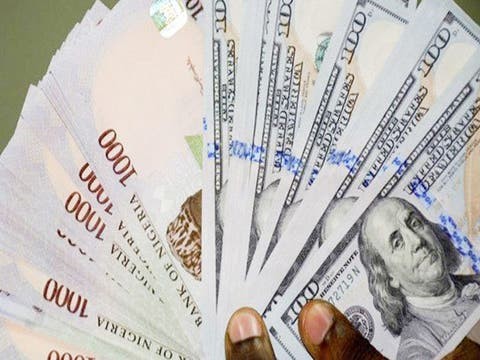With N381/$1 Exchange Rate Adjustment, FG, States Get More Cash

The adjustment of the official naira exchange rate from N361/$ to N381/$ by the Central Bank of Nigeria (CBN) means that the three tiers of government will have more naira to share during their monthly Federation Account Allocation Committee (FAAC) meetings.
The new rate was posted yesterday on the website of FMDQ OTC Securities Exchange, the Lagos-based platform that oversees foreign-exchange trading.
Revenue from Petroleum exports accounts for about 80 per cent of Nigeria’s earnings and makes up a significant portion of the amount that is shared monthly by the federal, state and local governments.
According to analysts, the exchange rate adjustment would benefit the three tiers of government as the new naira exchange rate at the official market means that they would get more naira to.
Others that are expected to benefit from the development according to analysts are the Foreign Portfolio Investors (FPIs) who invest in the Nigerian market as well as institutional investors with a huge dollar position.
However, the downside of the development according to analysts is that prices of goods and services are likely to rise as well as the landing cost of petrol.
The official exchange rate adjustment comes less than one week after the central bank adjusted the naira exchange rate at the Secondary Market Intervention Sales (SMIS) to N380/$1, which also used to be N360/$1.
A top central bank official had told THISDAY at the weekend that from time to time, the exchange rate adjustment would continue to happen, either upward or downward in line with market fundamentals.
“Certainly, no single rate can be achieved, but we would keep moving towards I&E rate,” the source had said.
The CBN Governor, Mr. Godwin Emefiele, recently assured investors that the desire of the central bank was to achieve exchange rate unification” around the Nigerian Autonomous Foreign Exchange Market (NAFEX)/ I&E rate.
Emefiele had explained thus: “What we mean by exchange rate unification is moving towards the NAFEX. NAFEX is our dominant market for the purchase and sale of forex and it is a free market where everybody is free to sell their dollars and those who want to buy are free to buy dollars.
“That means that whether you are a businessman, a bank, CBN, and you have dollars, you can bring it to the market to sell and if you want to buy dollars, you can come to the market.
“Like some of you must have seen, three years before 2019, we saw a relatively stable forex market because the NAFEX rate and even the rate at which the central bank transacts business outside the NAFEX were substantially close to each other. So, the CBN will continue to pursue unification around the NAFEX.”
Members of the Organised Private Sector (OPS) have commended the move by the CBN, saying the development would allow the exchange rate to reflect the market fundamentals and avoid distortions in the economy.
The Director-General of the (LCCI), Dr. Muda Yusuf, described the unification of the rates as an important move to stem the looming liquidity crisis in the foreign exchange market.
Yusuf stated that multiple exchange rates were a major source of distortion in the foreign exchange market as the system complicated the management of the foreign exchange market and perpetuated a rent economy that created opportunities for arbitrage, which engendered resource misallocation.
“It is imperative for the exchange rate to reflect the market fundamentals in order to ensure sustainability and promote efficiency in allocation mechanism. This is also critical for investors’ confidence. This should, however, be complemented with appropriate trade policy regime, fiscal policy measures and institutional strengthening to achieve the objective of heightening self-reliance and economic diversification,” Yusuf said.
He added that the disadvantages of the multiple exchange rate system are the impediments it posed “to the attraction of investment as well as inhibiting the inflow of foreign exchange and creation of transparency issues in the allocation of foreign exchange.” (Thisday)

